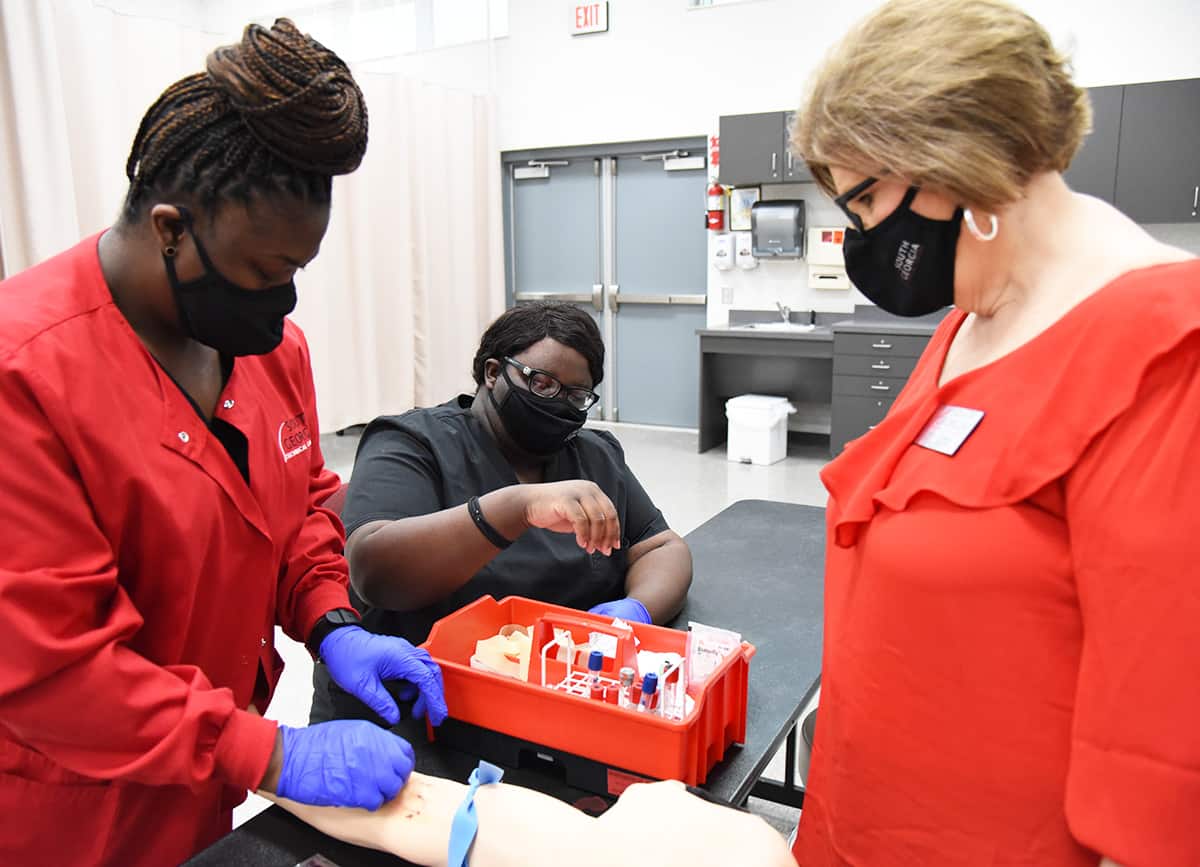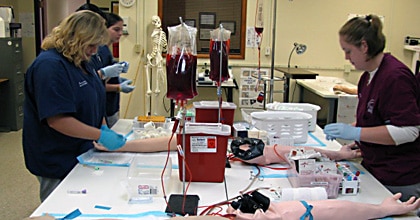Phlebotomy Courses Near Me: Why They're in High Demand
Phlebotomy Courses Near Me: Why They're in High Demand
Blog Article
The Path to Qualification: Comprehending the Phlebotomy Educating Program Trip and Its Importance
As you think about the course to qualification in phlebotomy, it is essential to comprehend the function you'll play in healthcare. Your training will cover crucial skills, from blood collection methods to patient communication. Each part of the program prepares you for the difficulties in advance. However what precisely does the trip involve, and why is qualification so crucial for your future occupation? Let's explore these questions even more.

The Function of Phlebotomists in Medical Care
Phlebotomists play a necessary role in the healthcare system, acting as the vital web link in between patients and necessary diagnostic screening. You'll carry out blood attracts, ensuring samples are collected precisely and securely. Your competence helps in identifying clinical problems, checking health and wellness, and directing therapy decisions.
In your day-to-day communications, you'll require to establish count on with people, making them feel comfy throughout what could be a difficult experience. You are accountable for identifying and handling samples very carefully to protect against contamination or mistakes, which can affect test results.
Beyond this, you'll frequently function alongside doctors and nurses, connecting important info concerning individuals' conditions. By mastering your abilities, you contribute meaningfully to client treatment, making you an important part of the clinical group.
Overview of Phlebotomy Training Programs
When checking out phlebotomy training programs, you'll discover various kinds made to fit different timetables and finding out styles. Each program assists you establish essential abilities like blood collection and client communication. Understanding these options is vital to picking the ideal course for your job.
Kinds Of Educating Programs
Several types of training programs are readily available for those looking to come to be efficient in phlebotomy. In addition, some health centers and centers supply on-the-job training programs, providing sensible experience while you learn. Whatever course you choose, each program intends to outfit you with the necessary abilities for an effective phlebotomy job.

Trick Skills Created
Grasping phlebotomy calls for a collection of key skills that are developed with comprehensive training programs. You'll learn technological skills like correct blood vessel selection, needle insertion, and blood collection methods. These hands-on practices ensure you can perform procedures securely and efficiently. Additionally, communication abilities are fundamental; you'll need to connect with people, explain procedures, and put them comfortable. Comprehending composition and physiology is crucial, too, as it helps you situate capillaries and comprehend the body's feedback to blood draws. You'll acquire understanding of safety and security methods and infection control, guaranteeing you maintain a clean and sterile atmosphere. Each of these skills is essential for your success as a licensed phlebotomist, making you a valuable property in any type of medical care setting.
Key Components of a Phlebotomy Training Course
In a phlebotomy program, you'll concentrate on necessary subjects that prepared for your future career. You'll participate in hands-on training that allows you to use what you have actually discovered in real-world setups. Both the core curriculum and sensible experience are vital for your success as a phlebotomist.
Core Educational Program Review
While seeking a phlebotomy training course, you'll come across a curriculum designed to outfit you with essential abilities and expertise. Phlebotomy Courses Near Me. This curriculum commonly includes makeup and physiology, concentrating on the circulatory system and recognizing blood components. You'll also discover different kinds of blood collection approaches, including venipuncture and capillary slit strategies
Furthermore, infection control and security methods are crucial elements, ensuring you recognize how to keep a sterilized atmosphere. You'll study patient communication, stressing communication and empathy, which are critical for alleviating patient anxiousness. Lastly, moral and lawful considerations will certainly be resolved, preparing you for real-world responsibilities. This foundational understanding will certainly enable you to excel as a phlebotomist and supply high quality care in medical setups.
Hands-On Training Experience
Obtaining hands-on experience is a crucial part of your phlebotomy training program. This functional training permits you to use what you have actually found out in a real-world setup, boosting your abilities and self-confidence. You'll exercise venipuncture methods, learn exactly how to take care of various kinds of samplings, and get acquainted with the tools utilized in the area. Under the advice of knowledgeable instructors, you'll refine your abilities, ensuring you're gotten ready for any circumstance you may face.
Additionally, you'll obtain the possibility to engage with individuals, which is vital for establishing your communication abilities. This mix of technical efficiency and interpersonal abilities is vital for your success as a qualified phlebotomist. Eventually, hands-on training is where concept satisfies practice, solidifying your expertise and readiness for certification.
Qualification and Licensing Demands
Prior to you can start your profession in phlebotomy, it is crucial to recognize the go to this web-site qualification and licensing needs that vary by state. Most states require phlebotomists to hold an accreditation from an identified company, such as the National Phlebotomy Association or the American Society for Professional Pathology. These qualifications generally entail passing an exam that evaluates your expertise and abilities in the area.
In enhancement to certification, some states have certain licensing demands. You might need to finish a certain variety of hours in medical practice, submit evidence of training, or undertake a background check. It is necessary to research your state's guidelines to ensure you meet all required requirements.
Remaining educated about these demands not just aids you protect a placement however additionally boosts your trustworthiness as an expert. By meeting these demands, you'll be well on your way to an effective job in phlebotomy.
Hands-On Training and Practical Experience
Hands-on training and useful experience are vital elements of your phlebotomy education and learning, as they permit you to apply theoretical expertise in real-world situations. Throughout your training, you'll take part in monitored venipuncture, discover correct techniques, and become knowledgeable about various blood collection tools. This straight participation is vital for building your self-confidence and sharpening your abilities.
You'll function very closely with experienced professionals that can guide you via the subtleties of client communication and sample handling. Each practice not only strengthens your understanding however additionally prepares you for the hectic atmosphere of healthcare setups.
In addition, numerous programs include medical rotations, permitting you to experience varied setups, from medical facilities to outpatient clinics. This direct exposure helps you adapt to different challenges and individual requirements, guaranteeing you're well-prepared for your future duty. Welcome these opportunities, as they're necessary to becoming a skilled and compassionate phlebotomist.
Obstacles Dealt With Throughout Training
While obtaining hands-on experience is necessary, it's crucial to acknowledge the difficulties that can emerge during your phlebotomy training. Additionally, mastering the abilities needed for blood draws takes technique; you might battle with technique originally.
Time administration can also be a hurdle, as harmonizing concept, functional sessions, and individual dedications can feel challenging. You might encounter differing discovering paces among your peers, causing feelings of self-doubt if you think you're falling back. Adapting to the different characters of instructors can be challenging, as each might have a distinct mentor style.
Identifying these obstacles early on can prepare you for success and aid you establish strength throughout your training trip.
Career Opportunities After Accreditation

As you obtain experience, you could also think about concentrating on locations like pediatric or geriatric phlebotomy, dealing with certain individual requirements. Some phlebotomists choose to progress their careers by coming to be lab technicians or pursuing further education in medical care areas.
In addition, your certification can lead to functions in training or monitoring new phlebotomists, allowing you to share your expertise. With the medical care sector continuously expanding, your skills will always be in need, leading the method for a steady and satisfying occupation. Accept the chances waiting for you!
Frequently Asked Questions
What Is the Typical Duration of a Phlebotomy Training Program?
Phlebotomy training programs typically last around four to eight weeks. You'll participate in hands-on practice, classroom direction, and on-line learning. Completing this training prepares you for certification and a rewarding career in medical care.
Are Online Phlebotomy Courses Available?
Yes, online phlebotomy training courses are available. They use flexibility and ease, allowing you to study at your very own pace. Simply confirm the program is approved to meet certification requirements and acquire important abilities click here to find out more for your job.
How Much Does Phlebotomy Training Normally Price?
Phlebotomy training normally sets you back between $700 and $2,500, relying on the program and area. You must consider variables like training course length, included materials, and hands-on experience when choosing the ideal training for you.
What Prevail Prerequisites for Phlebotomy Training?
Common requirements for phlebotomy training typically consist of a senior high school diploma or GED, booster shots, and a background check. Some programs may additionally need basic medical care understanding or qualifications, guaranteeing you're gotten ready for hands-on training.
Can I Function While Finishing My Phlebotomy Training?
Yes, you can work while finishing your phlebotomy training. Several trainees equilibrium work with their researches, yet make sure to manage your time efficiently to anchor guarantee you fulfill both job and training dedications effectively.
Report this page